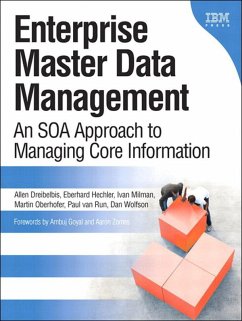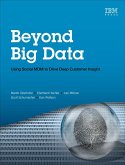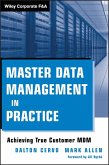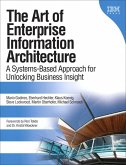The Only Complete Technical Primer for MDM Planners, Architects, and Implementers
Companies moving toward flexible SOA architectures often face difficult information management and integration challenges. The master data they rely on is often stored and managed in ways that are redundant, inconsistent, inaccessible, non-standardized, and poorly governed. Using Master Data Management (MDM), organizations can regain control of their master data, improve corresponding business processes, and maximize its value in SOA environments.
Enterprise Master Data Management provides an authoritative, vendor-independent MDM technical reference for practitioners: architects, technical analysts, consultants, solution designers, and senior IT decisionmakers. Written by the IBM ® data management innovators who are pioneering MDM, this book systematically introduces MDM's key concepts and technical themes, explains its business case, and illuminates how it interrelates with and enables SOA.
Drawing on their experience with cutting-edge projects, the authors introduce MDM patterns, blueprints, solutions, and best practices published nowhere else-everything you need to establish a consistent, manageable set of master data, and use it for competitive advantage.
Coverage includes
Companies moving toward flexible SOA architectures often face difficult information management and integration challenges. The master data they rely on is often stored and managed in ways that are redundant, inconsistent, inaccessible, non-standardized, and poorly governed. Using Master Data Management (MDM), organizations can regain control of their master data, improve corresponding business processes, and maximize its value in SOA environments.
Enterprise Master Data Management provides an authoritative, vendor-independent MDM technical reference for practitioners: architects, technical analysts, consultants, solution designers, and senior IT decisionmakers. Written by the IBM ® data management innovators who are pioneering MDM, this book systematically introduces MDM's key concepts and technical themes, explains its business case, and illuminates how it interrelates with and enables SOA.
Drawing on their experience with cutting-edge projects, the authors introduce MDM patterns, blueprints, solutions, and best practices published nowhere else-everything you need to establish a consistent, manageable set of master data, and use it for competitive advantage.
Coverage includes
- How MDM and SOA complement each other
- Using the MDM Reference Architecture to position and design MDM solutions within an enterprise
- Assessing the value and risks to master data and applying the right security controls
- Using PIM-MDM and CDI-MDM Solution Blueprints to address industry-specific information management challenges
- Explaining MDM patterns as enablers to accelerate consistent MDM deployments
- Incorporating MDM solutions into existing IT landscapes via MDM Integration Blueprints
- Leveraging master data as an enterprise asset-bringing people, processes, and technology together with MDM and data governance
- Best practices in MDM deployment, including data warehouse and SAP integration
Dieser Download kann aus rechtlichen Gründen nur mit Rechnungsadresse in A, B, BG, CY, CZ, D, DK, EW, E, FIN, F, GR, HR, H, IRL, I, LT, L, LR, M, NL, PL, P, R, S, SLO, SK ausgeliefert werden.









